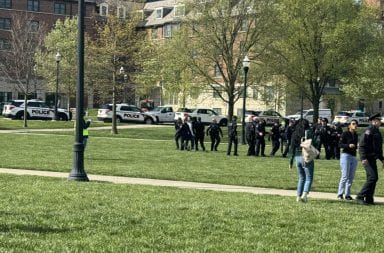With little fanfare, one of the greatest athletes in Ohio State history returned to Columbus this year.
Frank Howard, a Columbus native who played baseball and basketball for OSU from 1955-58, is in his first season as first base coach and outfield coordinator for the Columbus Clippers.
Howard is with the Clippers for the second time – he was the team’s interim manager in 2002 – and said he feels like he has come full circle.
“They say what goes around comes around,” Howard said. “I started out here as a young kid and I ended up here an old coach.”
After graduating from South High School, Howard enrolled at OSU. For the next three-and-a-half years he excelled at basketball and baseball for the Buckeyes and was a 1957 All-American in basketball.
Howard has many fond memories of his time at OSU, but more than all those great memories, Howard is most thankful for his education. He said he wants today’s young athletes to realize the importance of an education.
“The value of an education, it really is unparalleled,” he said. “We try to stress the fact that we hope they’re in this game a long time, but boy if you’re not, you’ve got to back that up with a good, solid college education.”
Ironically, Howard did not finish his degree at OSU. He left the university in 1958 to sign with the Los Angeles Dodgers with 18 credit hours remaining to complete his degree.
“I used to say maybe I can get it with my children, then maybe with my grandchildren,” he said. “There are some things I’ve regretted in my lifetime, but it probably stands right at the top of the list. I really do wish I had gone back and finished.”
After thinking for a moment Howard said, “Is there an age limit? I’ll be 69 in August, maybe I should (come back),” he said with a laugh. “I don’t dwell on it.”
After leaving OSU, Howard was drafted into the NBA, but never signed. He played parts of the 1958 and 1959 seasons with the Dodgers before winning the 1960 National League Rookie of the Year Award in his first full season. He also won World Series titles in Los Angeles in 1959 and 1963.
He was then traded to the Washington Senators for the 1965 season. He is most recognized for his time there, where he was known to Washington fans as “Hondo” and the “Capital Punisher.”
When the Senators moved to Texas in 1972, Howard moved with them. He was then traded to Detroit, and finished his career with one season in Japan. He retired in 1974 because of a leg injury. In his coaching career, he managed the New York Mets and San Diego Padres in the early 1980s and has managed several teams in the minors.
Howard finished his career with 382 home runs, which currently ties him for 48th on the all-time list. As a Senator, he led the American League with 44 home runs in both 1968 and 1970. However, he said his greatest days as a player were in Los Angeles.
“I was a full time player in Washington, but this is America. Americans love winners,” Howard said. “I played on two world championship ball clubs in Los Angeles. We all want a sense of recognition. We want to be recognized as a winner, as a gamer. That recognition comes from playing on a world championship ball club. Anything that I’ve ever done as an individual athlete is superseded by the fact that I played on world championship clubs.”
Baseball returned to Washington this season when the Montreal Expos moved to the nation’s capital and became the Washington Nationals.
“I think it’s great for the area,” Howard said. “I think the job (they) have done in presenting baseball back there has been phenomenal.”
New York Yankees owner George Steinbrenner sent Howard back to Washington this spring to participate in the festivities of Nationals.
“The New York Yankees welcome Washington back to Major League Baseball,” Howard said. “(Steinbrenner) said ‘We wish them all the success in the world, except when we play them in the World Series.'”
Howard remains modest and self-effacing, joking about times he struck out multiple times in one game, but not bragging about some of the tape measure home runs he hit. He tries to instill these values in today’s young players.
“Act like a pro, act like a big leaguer. It goes beyond skill,” Howard said. “It should dictate to you as an individual your ability to communicate with everybody, to show them some respect, some sense of dignity, consideration.”


